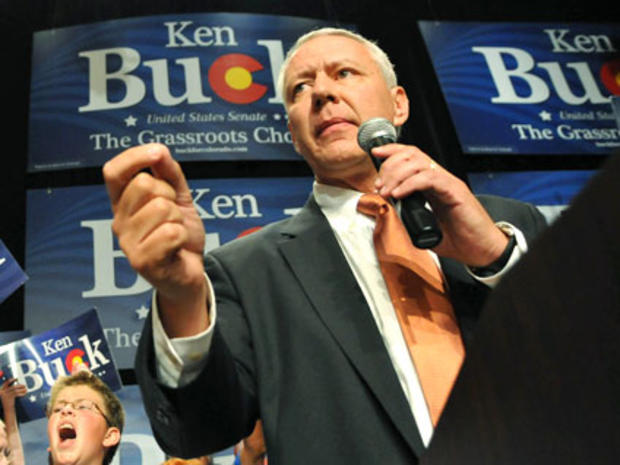Will "Insurgent" Candidates Help or Hurt the GOP?
You don't usually think of a Bob Dylan line when you think of trends in the Republican Party, but a fragment from "Subterranean Homesick Blues" sure seems to sum up the behavior of the rank-and-file this primary season: "don't follow leaders..."
GOP voters in Colorado this week joined in a trend that has rolled from one end of the country to the other this cycle: rejecting the candidate of state and national party leaders in favor of "outsiders."
Collectively, these party stalwarts have made a wager that will determine whether Republicans gain control of the Senate this November; a wager that is premised on the idea that these insurgent nominees will draw enough disaffected, "angry" voters to make up for the potential loss of centrists.
When Colorado Republicans chose District Attorney Ken Buck over former Lt. Governor Jane Norton, they chose a "movement conservative" whose views on issues such as Social Security (he seems at times to favor its radical restructuring, if not abolition) are far removed from those of more moderate Republicans. For these voters, however, Jane Norton's past experience made her part of the problem -- the problem being an out-of-touch overbearing government. In this sense, Colorado Republicans were following in the footsteps of five other states.
- Back in 2009, Pennsylvania Senator Arlen Specter was so sure he would lose the primary to ex-Rep Pete Toomey -- who almost beat him in 2004 --that he switched to the Democrats in a vain attempt to save his career (the ploy failed; he lost the Democratic primary to Rep. Joe Sestak).
- Earlier his year, Florida Gov. Charlie Crist -- presumed to be the sure winner of an open Senate seat -- fled the GOP after it became clear he would lose in a landslide to Florida House Speaker Marco Rubio. Crist is now running as an independent, and is receiving the unofficial backing of many Democrats.
- In Kentucky, the influence of Senate Minority Leader Mitch McConnell was not enough to keep Rand Paul (son of Texas Rep. Ron Paul) from winning the Republican primary, thus giving Democrats the hope that his views on the federal government (he expressed skepticism about the 1964 Civil Right Act) would make the race competitive.
- In Utah, three-term Senator Bob Bennett, a staunch conservative, was denied re-nomination at the state Republican convention for the sin of voting for the Troubled Asset Relief Program. (Utah is so solidly Republican that Democrats have virtually no chance of mounting a challenge).
- In Nevada, Republican voters shunned the establishment choice of former state senator Sue Lowden in favor of former state legislator Sharron Angle, who won with strong Tea Party support. Democrats in Nevada believe her nomination may enable Senate Majority Leader Harry Reid, a highly endangered incumbent, to survive. They take heart from the refusal of some prominent Nevada Republicans to endorse Angle.
So: have these Republican voters, in their enthusiasm for candidates who embody a strong sense of disaffection with "business as usual," made it harder for their party to win enough seats to take over the Senate?
The evidence is murky, as it well might be considering that the election is two and a half months away. Each of these "insurgent" candidates is either leading or tied with their chief opponents. And if the mid-term election turns into a "wave" -- where strong national trends overwhelm local concerns -- then these "outsiders" may well sweep into office.
Apart from November, however, the success of these campaigns has clearly had one significant impact on politics. It has made clear even to the most moderate of Republican Senators the high cost of crossing party lines and cooperating with President Obama -- who is viewed by the more militant wing of the Republican Party not as an adversary, or opponent, but as an enemy. If prospects of anything approaching "bipartisan cooperation" were bleak a year ago, they are just about non-existent now.
Obama, Tea Party Take Victory from Colo. Primary
Interactive Map: CBS News Election 2010 Race Ratings

